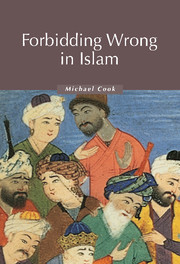Book contents
- Frontmatter
- Contents
- Preface
- Map
- 1 Introduction
- 2 The elements of the duty of forbidding wrong
- 3 How is wrong to be forbidden?
- 4 When is one unable to forbid wrong?
- 5 What about privacy?
- 6 The state as an agent of forbidding wrong
- 7 The state as an agent of wrongdoing
- 8 Is anyone against forbidding wrong?
- 9 What was forbidding wrong like in practice?
- 10 What has changed for the Sunnīs in modern times?
- 11 What has changed for the Imāmīs in modern times?
- 12 Do non-Islamic cultures have similar values?
- 13 Do we have a similar value?
- Index
11 - What has changed for the Imāmīs in modern times?
Published online by Cambridge University Press: 05 June 2012
- Frontmatter
- Contents
- Preface
- Map
- 1 Introduction
- 2 The elements of the duty of forbidding wrong
- 3 How is wrong to be forbidden?
- 4 When is one unable to forbid wrong?
- 5 What about privacy?
- 6 The state as an agent of forbidding wrong
- 7 The state as an agent of wrongdoing
- 8 Is anyone against forbidding wrong?
- 9 What was forbidding wrong like in practice?
- 10 What has changed for the Sunnīs in modern times?
- 11 What has changed for the Imāmīs in modern times?
- 12 Do non-Islamic cultures have similar values?
- 13 Do we have a similar value?
- Index
Summary
The Imāmīs differ from the Sunnīs in some obvious ways. They are very much in a minority within the Islamic world as a whole; their geographical distribution is more concentrated; the role of the clergy in their religious life was traditionally more salient, and in the last century has become even more so. By way of introduction to modern Imāmī thought about forbidding wrong, it may be helpful to start with some implications of these contrasts.
Comparing Imāmīs and Sunnīs
One significant effect of the minority status of the Imāmīs is that it makes for asymmetrical literary relations between the two communities. It is rare indeed for Sunnī authors to show awareness of Imāmī views, let alone a willingness to learn from them. A few Egyptian writers sympathetic to the Muʿtazilites make occasional reference to the Imāmīs in accordance with their catholic approach to the resources of the wider Islamic tradition. But for all their openness, they know little about traditional Imāmī thought, and nothing about modern developments. Imāmī scholars, by contrast, are often prepared to make some use of the resources of Sunnī Islam. They like to draw on the first modern commentary on the Koran, that of ʿAbduh and Riḍā; it even finds its way into the newspapers of the Islamic Republic. Imāmī authors also go back to older Sunnī sources.
- Type
- Chapter
- Information
- Forbidding Wrong in IslamAn Introduction, pp. 131 - 146Publisher: Cambridge University PressPrint publication year: 2003

